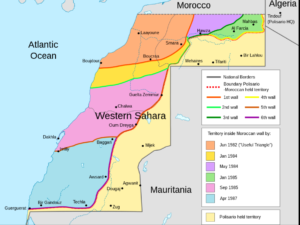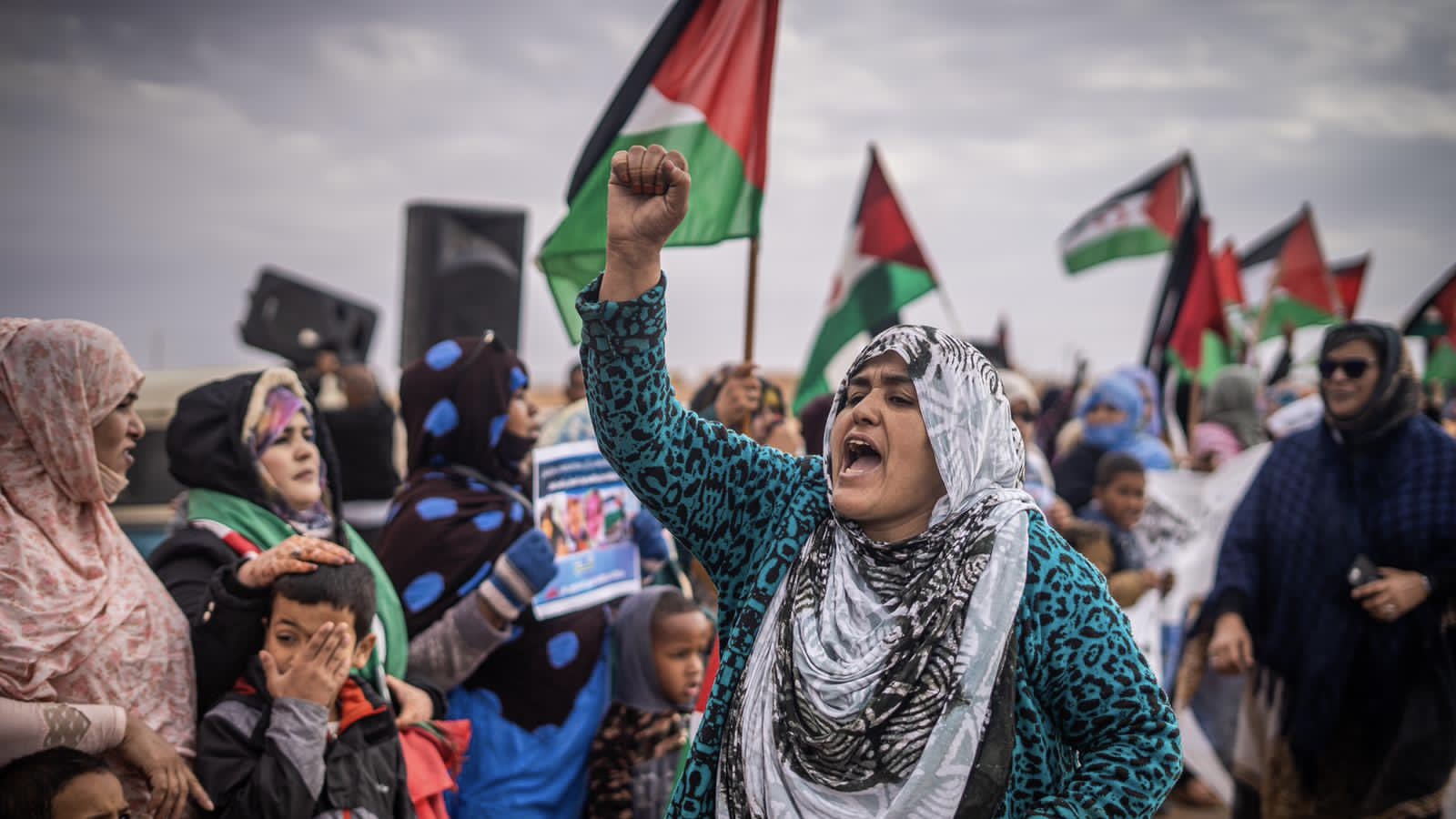Moroccan forces illegally occupying the Sahrawi Arab Democratic Republic (SADR) have come under repeated bombardment by the Sahrawi People’s Liberation Army (SPLA). Moroccan forces currently occupy over 80% of SADR, also known as Western Sahara, which remains classified by the UN as among the last countries still awaiting decolonization.
On Friday, December 30, according to a statement by the Ministry of Defense of SADR, the SPLA “targeted the trenches of the occupation soldiers in several areas of the Mahbas sector.” The SPLA bombarded the positions of occupation forces in this region, in the northeast of occupied territory, for the third consecutive day on Friday. Attacks were also reported on December 28 and 29, inflicting “heavy losses in lives and equipment along the wall of humiliation and shame.”
This wall, called the “Berm”, runs from northeast to southwest across the SADR territory. It separates the areas occupied by Morocco on the coast-side from the inland territory that is under the control of the Polisario Front (PF), recognized by the UN General Assembly as the Sahrawi people’s international representative.
Morocco constructed the berm in the 1980s, with the help of American companies Northrop and Westinghouse. At 2,700 kilometers in length, it is among the largest military infrastructures in the world, and the planet’s second-longest wall. It is reinforced with the world’s longest minefield consisting of seven million landmines.

The SPLA has been engaging the occupying troops along the length of the berm since the war for liberation of SADR resumed on November 13, 2020, after 29 years of ceasefire. The ceasefire broke down after Moroccan troops crossed the berm to forcibly remove unarmed and peaceful Sahrawi protesters who were blocking an illegal Moroccan road to Mauritania through their territory. The Moroccan troops crossed into the UN-patrolled buffer zone of Guergarat across the southeastern tip of occupied SADR.
The ceasefire had been secured in August 1991 after the UN Security Council (UNSC) established the UN Mission for the Referendum in Western Sahara (MINURSO) with the promise of fulfilling the Sahrawi people’s right to self-determination. However, backed by the US, UK, and the EU, Morocco successfully sabotaged the referendum promised by the UN, and MINURSO was reduced to a peace-keeping force.
Read: Ahead of UN session, Sahrawis recollect decades of betrayal that enabled Moroccan colonization
For the Sahrawis under occupation, the nearly three decades of ceasefire are often considered wasted years. Moroccan forces continued “their savagery and violence,” while Sahrawis “were forced by the international community to wait for nothing. There was no war, no peace, no hope,” Hamza Lakhal, a dissident poet from Laayoune, the occupied territory’s largest city, told Peoples Dispatch.
“When the war started, it renewed hope of liberation in the people because our brothers on the other side of the berm had again taken arms again to free us from occupation,” he said. It is with this hope that the people have been able to endure the increasing atrocities at the hands of the occupying forces since the resumption of the war, Lakhal explained.
However, the interests at play in the war go far beyond Morocco’s borders. The occupying power has received key gestures of support from Western powers since fighting resumed, which many argue has emboldened it even further.
On December 10, 2020, the Donald Trump administration in the US announced that “the United States recognizes Moroccan sovereignty over the entire Western Sahara territory.” Arguing that “an independent Sahrawi State is not a realistic option for resolving the conflict,” the US declared that autonomy under Moroccan sovereignty is “the only basis for a just and lasting solution to the dispute.”
The US government’s approval of Moroccan occupation of Western Sahara came in exchange for its normalization of diplomatic relations with Israel on the same day. Since Joe Biden took office in January 2021, the endorsement of Morocco’s occupation of Western Sahara has been reiterated.
Former colonizer of the territory, Spain, which had handed over the territory of Western Sahara to the invading Moroccan forces in 1975, once again in March 2022 rescinded recognition of SADR and accepted Morocco’s claim of sovereignty over the territory.
EU’s stake in the occupation
The European Union (EU) was quick to welcome this decision by Spain. Strong bilateral relations between its member-states and Morocco “can only be beneficial for the implementation of the Euro-Moroccan partnership,” explained EU Foreign Policy chief Josep Borrell’s spokesperson following the announcement.
This partnership, which was cemented by the establishment of a Free Trade Area in 1996, ensures that the EU remains Morocco’s largest trading partner, accounting for 56% of the goods trade in 2019 and for 51% of Morocco’s imports. The “sustainable fisheries partnership” which allows European companies to fish in waters outside the EU is a cornerstone of the partnership. Interestingly enough, over 90% of the fish caught by European fleets under this “Euro-Moroccan partnership” are extracted from the waters of SADR. This continues despite being ruled illegal multiple times since 2018 by the Court of Justice of the European Union (CJEU) which, reiterating the 1975 advisory opinion of the International Court of Justice (ICJ), concluded that Morocco had no sovereignty over SADR’s territory.
40% of all European phosphate imports also come from Morocco, and this figure is predicted to increase as Europe seeks alternatives to Russian fertilizers in the backdrop of the war in Ukraine. At least 10% of the profits generated by OCP SA, Moroccan state-owned phosphate rock miner, phosphoric acid manufacturer and fertilizer producer, come from the phosphate extracted from the Bau Craa mine in occupied Sahrawi territory.
“We are told this so-called ‘trade’ of our resources between EU and Morocco also benefits our local economy. It is the big lie,” Lakhal said. “All those tens of millions the EU has been paying in return every year goes to Morocco. The money is used to strengthen its occupation forces,” he said.
“The Moroccan policemen outnumber all the Sahrawi civilians under occupation. Including all soldiers and the settlers the regime has brought in from Morocco, we are outnumbered one-to-three.”
‘We will resist the occupation to death; we have nothing to lose – not even our homeland’
Lakhal claimed that all the engineering or managerial jobs in these extractive industries go to the Moroccan settlers, while the Sahrawis only get jobs involving physical labor. “Even these jobs are taken away from Sahrawi workers if any of them are identified as activists. They can’t find any other jobs once they are branded. They are either forced to depend on others for survival or starve,” he alleged.
“Students are pulled out of schools and colleges, and denied opportunity to complete studies when they are identified as activists,” added Lakhal, who himself was a victim as he was suspended from college in 2002 for leading a campaign demanding a university in the occupied territory. “I was barred from continuing studies or holding a job. It was only with the help of pro-Sahrawi activists abroad that I was able to survive.”
It was more than a decade later, in 2015, after his case drew international attention following the publication of his poetry, that he was allowed to finally travel to Morocco to complete his graduation. “We still don’t have a university in [our land]. Students have to go to Morocco to finish their graduation. Anyone seen as an activist is denied this opportunity,” he said, explaining how education is used as leverage against the cause of Sahrawi liberation.
Those who refuse to budge to these systems of control and intimidation and succeed in organizing resistance are subjected to physical attacks, sexual assault and torture. However, “There is no weapon of repression in the regime’s arsenal that has not been deployed against us. And yet, we resist; we will resist the occupation to death because we have nothing to lose – not even our homeland,” Lakhal insists.
“There is nothing the regime can do about it. I mean, look at Sultana Khayya. What more can they do to her?” he asks. Khayya is currently trying to secure a safe passage back to the occupied territory to continue her struggle for Sahrawi liberation in ground-zero.
“It doesn’t matter what the so-called ‘international community’ does. We know our rights, and we will fight for them under any circumstances, with or without their support,” Lakhal asserted, asking the UNSC to “stop its pretense about human rights and democracy.” He also called on the “international community” to “stop its hypocrisy”.
“They will move NATO for Ukraine because they hate Russia, but occupation of Sahrawi against all international laws and resolutions is okay because the occupying power here is a friend,” he remarked.





